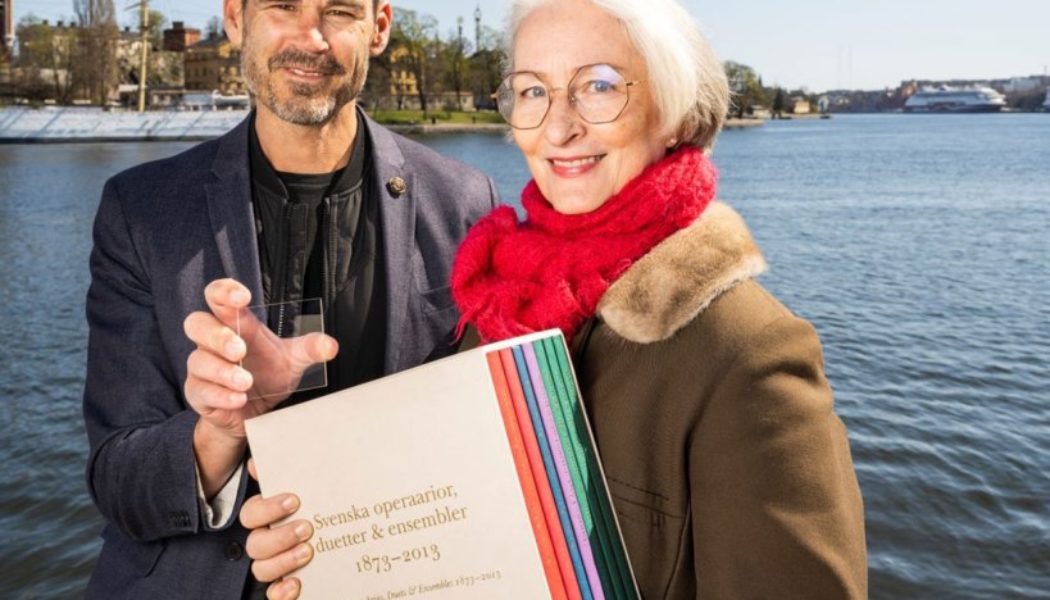LONDON —A Norwegian company that is planning to create a doomsday vault to preserve the world’s most important music works has partnered with Microsoft on what it calls a “paradigm-breaking” storage solution capable of holding recordings for many thousands of years.
Oslo-based Elire Group teamed up with the tech giant to come up with a “proof of concept” silica glass platter that can be used as a medium for storing master-quality digital copies of music recordings, which are burnt into the glass using state-of-the-art laser optics.
Elire plans to initially store the glass capsules in a dedicated space inside the Arctic World Archive, an existing underground storage facility located on a remote arctic island midway between Norway and the North Pole.
Opened in 2017, the Arctic World Archive houses digital copies of historical artifacts like Vatican Library manuscripts and paintings by Rembrandt and Edvard Munch. It’s located deep inside the same snow-covered mountain as the Global Seed Vault, a backup storage facility for the world’s genetic resources. Both are designed to withstand natural and man-made disasters, including nuclear attacks.
The Global Music Vault, which was first revealed last year, will offer music recordings the same level of extreme protection, says Elire, the commercial venture group financing the project.
“Today’s digital and physical data storage methods are fast becoming outdated and obsolete,” says Luke Jenkinson, managing director of the Global Music Vault and managing partner at Elire. He calls the silica glass format designed by Microsoft a “future-proof solution” that meets the music industry’s need for secure long-term storage for recordings.
The importance of safe storage for music recordings was underscored by a 2008 fire at a Universal Studios backlot that saw a significant number of tapes archived by Universal Music Group destroyed, including some masters, although the company had secondary copies of many of them.
There are also potential risks with digital storage. MySpace confirmed in 2019 that a server migration led to the loss of up to 50 million uploaded tracks.
The Global Music Vault and silica glass capsules developed by Microsoft will offer far greater levels of protection, says Jenkinson, providing migration-free storage that has a data lifetime of many thousands of years. “The music data they store basically lasts forever,” he tells Billboard.
A team at Microsoft’s Research Lab in Cambridge, England, developed the silica glass storage capsules, as part of its Project Silica program. The thin square glass capsules measure 75mm x75mm x 2mm— roughly the size of a glass drink coaster. They are fully resilient to electromagnetic pulses and can be baked, boiled, scoured, frozen and submerged in water without the data written onto the glass suffering any degradation, Elire says.

The proof-of-concept music capsule holds 150GB of data (equivalent to approximately 215 CDs), although Jenkinson believes the silica glass format will soon be capable of holding one terabyte of data (1,000 GB) and may eventually be able to hold up to 10 terabytes.
Digital copies of music recordings are encoded into the capsules by ultra-fast lasers, which create layers of three-dimensional nanoscale gratings and deformations in the glass. To retrieve the information, in this case music recordings, Microsoft has developed machine learning algorithms that read the data back by decoding images and patterns that are created as polarized light shines through the glass.
Jurgen Willis, Microsoft’s vice president of program management, says storing data on fused silica glass “can help achieve the goal of preserving and safeguarding the world’s most valuable music for posterity, on a medium that will stand the test of time.”
Prior to partnering with Microsoft, Elire had explored other ways of sustainably preserving music data, including using binary coding and high-density QR codes written onto special durable optical film, which is also designed to last more 1,000 years. The company says it is open to using different tech storage solutions alongside its ongoing partnership with Microsoft.
At present, only one glass music data capsule has been made as a proof of concept. It contains copies of culturally important music recordings owned by the International Library of African Music, The National Library of New Zealand, Kenya’s Ketebul Music archive and Lebanon’s Fayha Choir, as well as audio visual content from Sweden’s Polar Music Prize, including interviews with Patti Smith and Paul Simon, and live performances by Manfred Mann and Stevie Wonder.
The test capsule also features a selection of works by Anglo-American singer-songwriter Beatie Wolfe, who has regularly experimented with technology and innovative distribution methods, including beaming her music into space using New Jersey’s historic Holmdel Horn Antenna.
Wolfe calls the Global Music Vault an important development in music preservation. “In an age where music has become increasingly disposable and devalued, this is a wonderful reminder of its long-term value for humanity,” she says.
The vault’s first deposits, which will include the inaugural proof of concept capsule, were originally scheduled for this year but will now take place in fall 2023 due to delays caused by the COVID-19 pandemic, says Jenkinson. At first, they will be placed inside the Arctic World Archive, although Elire wants to build its own dedicated vault on the Svalbard archipelago, which is a demilitarized zone, and eventually commercialize the venture by charging companies and artists for making deposits.
In the meantime, organizers are launching its global Project ARV, calling for national music business groups to nominate culturally important music to be preserved in the vault. Elire has partnered with the Paris-based International Music Council to form a global committee that will oversee the selection process.
“We want the whole world to know about the Global Music Vault, get involved and help shape it with us,” says Jenkinson. “If the music industry can start looking at greener tech alternatives for storing music, then it can really reduce its footprint, as well as safeguarding music for the future.”
[flexi-common-toolbar] [flexi-form class=”flexi_form_style” title=”Submit to Flexi” name=”my_form” ajax=”true”][flexi-form-tag type=”post_title” class=”fl-input” title=”Title” value=”” required=”true”][flexi-form-tag type=”category” title=”Select category”][flexi-form-tag type=”tag” title=”Insert tag”][flexi-form-tag type=”article” class=”fl-textarea” title=”Description” ][flexi-form-tag type=”file” title=”Select file” required=”true”][flexi-form-tag type=”submit” name=”submit” value=”Submit Now”] [/flexi-form]










Tagged: business, entertainment blog, International, Microsoft, music blog, Norway, Tech, technology